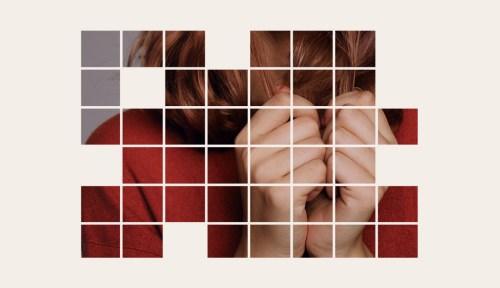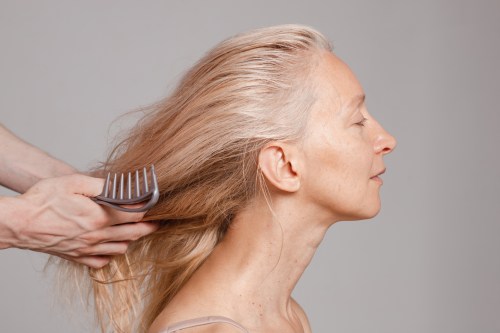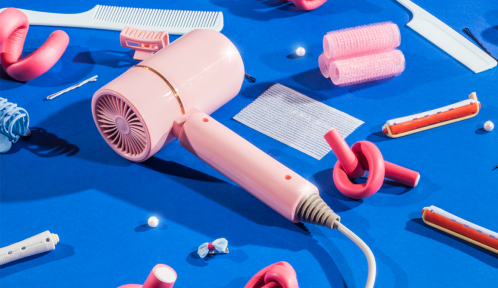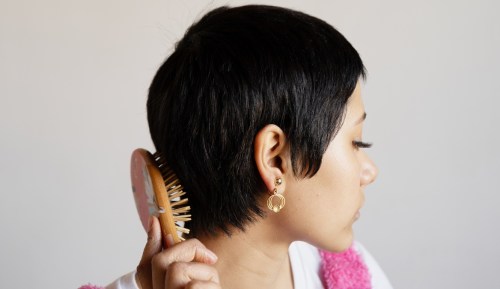When I was a sophomore in college, I became wholly consumed with plucking my eyebrows…and not in the way I’d been in the ‘90s when I wanted pin-thin brows like Drew Barrymore and Shannen Doherty. This had nothing to do with trends—it was a compulsion. The second I could feel even the slightest growth beneath my skin, the prickly sensation would send me to spend hours plucking tiny stray hairs—at times until they bled. I later learned that this obsessive hair-pulling was a nervous disorder known as trichotillomania.
“Trichotillomania is a mental disorder characterized by the repeated pulling out of one’s hair, resulting in hair loss,” Bill Hudenko, PhD, global head of mental health at K Health, says. For most people diagnosed with trich (as it’s often referred to), the disorder typically relates to a nervous plucking of eyelashes or hair from your head. “Patchy areas on the scalp [are a common result of the disorder],” says trichologist Penny James of New York City’s Penny James Salon. “The hair at the roots is often flared, tufted from being pulled out frequently.”
As Dr. Hudenko explains, “In order to be diagnosed, trichotillomania must cause clinically significant distress or impairment in social, occupational or other important areas of functioning. It isn’t technically a subform of obsessive-compulsive disorder; however, it’s closely related and has both obsessive and compulsive elements to it.”
Why people don’t talk about trich
In an era when depression and anxiety have become more open to discussion, trich is still considered taboo. “You must understand the people who pull their hair out are ashamed and embarrassed by their behavior,” James says of her experience with trich patients. “They don’t like to talk about it or share with people what they’re doing. Often it’s camouflaged by careful styling tricks or the use of powders applied to the hair like Toppik [colored hair-building fibers].”
There’s debate over whether trichotillomania is truly rare. James insists people just don’t talk about it, while Dr. Hudenko says, “Many people don’t formally recognize trichotillomania as a disorder, but rather they consider it to be just a bad habit.” Even though it’s one of the lesser-publicized nervous disorders, it’s not unheard of—Megan Fox, Olivia Munn, Charlize Theron, and Justin Timberlake have opened up about their experiences with the condition.
James has seen an immense uptick in trich patients in her practice since the start of the pandemic. She notes that her clients have said that when they’re working from home, “there’s no one around to see them pulling at their hair.”
With anxiety disorders reportedly at an increase of 26 percent in 2020, it makes sense trich cases heightened as well. “Hair-pulling is a soothing behavior that’s related to anxiety reduction,” Dr. Hudenko says of people who experience trich. “They don’t find it painful to pull their hair, and they experience a tension reduction associated with the behavior.”
Trich symptoms can change over time
As for my own experience, my eyebrow fixation shifted after a year or two. I’ve never felt the urge to tug at my scalp or eyelashes, but for the last 10 years, I’ve become consumed by the hair on my face (Dr. Hudenko says it’s common for the intensity or location of hair-pulling to change over time).
It has nothing to do with appearance, but rather it’s the idea of feeling those prickly hairs the moment they come to the surface. What I don’t think people realize is that like other nervous or obsessive disorders, trich is debilitating in its own right. Until you tend to the issue, it’s all you can think about. Having a tweezer by my side at all times is a top priority.
Treatments for trich
Though treating the disorder can be difficult, Dr. Hudenko notes that many people experience success. “The most common treatments for trichotillomania include a combination of behavioral therapies and psychotropic medication,” he says. “Typically medications for anxiety or depression, such as SSRIs [which stands for selective serotonin reuptake inhibitors].”
James agrees, adding that “people with anxiety, depression and somatoform disorder” are more prone to trichotillomania. She goes on to say, “Having a relationship with a psychiatrist will be very helpful in controlling the urge to pull hair. Often, the person who is pulling their hair out becomes even more obsessed by the amount of hair that has been lost.”
Living with trich
Even after finally completing a full seven-session round of laser hair removal, for me, the problem hasn’t really dissipated. Sure, there are far fewer hairs to worry about, but feeling even just one makes me uneasy. I want to say I’ve cracked the code to dealing with this issue, but it’s still prevalent. What I have done is at least start a conversation around the topic. Like any other “unique” roadblock in life, if I accept and address this, I’m one step closer to normalizing it or helping someone else who thinks their situation is “weird.”
Oh hi! You look like someone who loves free workouts, discounts for cutting-edge wellness brands, and exclusive Well+Good content. Sign up for Well+, our online community of wellness insiders, and unlock your rewards instantly.
Sign Up for Our Daily Newsletter
Get all the latest in wellness, trends, food, fitness, beauty, and more delivered right to your inbox.
Got it, you've been added to our email list.











